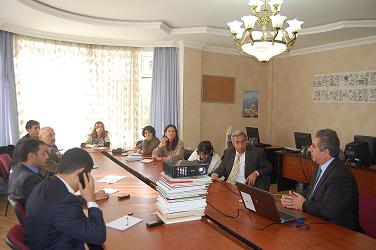ERC organized seminar for journalists

November 20, 2013 - The seminar on " Management of oil revenues in Azerbaijan: current situation and perspectives" was organized for journalists at the conference hall of the Economic Research Center with financial and methodical support of Revenue Watch Institute. The policy paper analyzing the situation related to management of oil and gas revenues in Azerbaijan within the framework of " Revenue management improvement: Case study on management of Azerbaijan and Kazakhstan" was presented to the journalists.
The head of ERC expert group, GubadIbadoglu, mentioned that in this policy paper the current state of macro-economic environment, fiscal rules and legal foundations were analyzed. Similarly, the policy of management of oil revenues, revenue management, including the role of those involved to this process, especially the participation of Oil Fund had were assessed.
According to G.Ibadoglu, the share of oil and oil products in the total export constitutes 92,6 percent. Additionally, 73,1 percent of 2012 budget was formulated of oil revenues. If the price of oil will be constant within upcoming 11 years given the expected rate of production and the proven reserves, the oil revenues of the government will be 1.5 times more than the revenues to be collected until 2013. However, more revenues do not necessarily mean that they will be spent effectively. Thus, Azerbaijan has gained 60618,4 million manat from the exploitation of “ Azari-Chirga-Gunashli” oil field until July 01, 2012. The 56,4 % of this amount has been expended. Moreover, 30457,5 million manat of expended 33109,3 million manat or 92% has been financed through the sale of Azeri oil between 01 January 2008 and 01 July 2012. According to the forecast of the State Oil Fund, expenditures of the Fund will be 424379,3million USD during 2013-2016 or 33367,5 million manat in conformity with exchange rate of July 25, 2012. Thus, the average annual expenditures of the State Oil Fund will constitute 8341,8 million manat for the next 4 years, according to the projections. In fact, although oil production was reached to its peak in 2012, the volume of expenditures and the pace of government can bring about the encroachment of “saving minimum 25 % revenues” principle considered within “Strategy for long-term management of oil and gas revenues”.
Another problem is related to legal base of management of Oil Fund where the revenues are agglomerated: “there are no any fiscal rules regarding expenditures from the Oil Fund as well as its projection. Also, the law on Oil Fund does not exist. If the volume of expenditures transferred from SOFAZ to the state budget will be carried on with the level of 2013( an average 14 billion dollar), in this case the expected oil revenues will be depleted in 10-12 years.”
The expert also underlined that the investment policy of the Oil Fund was one of the focuses of the research: “ The Oil Fund had invested 1 billion 700 million dollar for real estate in foreign countries. Furthermore, the agency has invested finance to offshore fields, for example, allocated funds for management of real estate in Jersey islands and established subsidiary companies. These are the names of those companies established in those islands: “SOF AZ Re Ltd.”, “SOF AZ Re UK L.P”, “SOF AZ Re Min Ltd. 78,St Jamess Street Unit Trust”. In fact, principles set in the Statue of the Oil Fund prevent it to establish such subsidiary companies. Besides, there is lack of transparency in regard to creation of such companies.”
After the presentation, G.Ibadoglu responded to the questions of journalists.
ERC Public Relations Department
